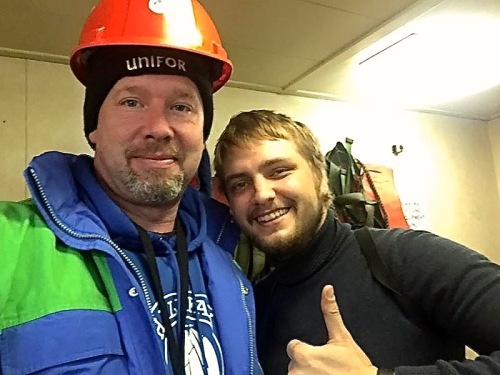
Captain Jian Sheng Wang (left) oversees payout of crew in Vancouver. ILWU Marine Section staffer Cindy Li (right) helped ensure the men received the cash owing them.
It’s rare that every shameful aspect of the Trudeau government’s trade agenda comes together in a single horrifying story. This month, in the Port of Vancouver, they did.
Twenty-one Chinese seafarers sailed alongside last week to load Canadian grain. Some were being paid less than half what their contract required, and even the those wages were overdue. Families at home hadn’t received their allotments. The ITF investigated. We got the company to agree to pay up the $146,466 owing and stood watch as the money they’d been cheated of was handed to each of the crew, in cash. But the mooring lines had barely been cast off when their employer snatched the money back out of their hands. And that may have been the least of the punishments that rained down on whichever unlucky crew members the company decided to use as an example to anyone thinking of asserting their labour rights in future.
Canada is hell-bent on a trade deal with China. We’ve already signed one with Europe — and we know how that’s going. Nineteen crew aboard the European-owned Ben Wyvis sailed into Vancouver this month cheated of $261,346 — more than a quarter of a million dollars.
Ordinary Canadians have struggled to understand that racism and economic exploitation is part of the country’s history. They’re working hard to live democratically and promote economic justice. And their government is capitalizing on those noble instincts in order to market its corrupt and shameful trade deals as a chance to “bravely expand a globalized trading system” for what it says will be the benefit of all.
This week, we met 21 Chinese seafarers who would beg to differ.
(A head’s up: This post is a bit longer than some, but we think the details of the crew’s situation are worth recording. There’s something in the sharing of another worker’s story that sometimes helps us feel the weight of trade debates that are orchestrated to sound lofty, upbeat and oddly unrelated to the fellow human beings who will pay the price of enacting them. Pour a drink and read on.)
Our story begins in mid-December of last year, with a Chinese crew member aboard the Liberian-flagged Yangze 7 who had been in contact with Japanese ITF inspector Fusao Ohori. The seafarer used an anonymous name — Andy — and an anonymous email account to talk. Anonymity is essential for Chinese crew serving on internationally trading vessels; breaking rank can mean anything from a fine to blacklisting and the death of a career at sea.
Andy’s email detailed a number of issues: not enough food, late payment of salaries, families who had not received home allotments since October — and crew possibly cheated on their basic salaries.
For Chinese crew, much of this is typical.
For many years, ITF inspectors worldwide have known about the practice of double bookkeeping on Chinese-crewed ships. Sometimes, although it’s rare, we actually pry the documents of proof loose. Double-booking takes place when the company and the captain keep one set of books for ITF inspectors (and sometimes maritime authorities) who might ask to see payroll records. They keep a second set of books or payroll records that show actual salaries paid. To the uninitiated, the first set shows a world so perfect we can only marvel at the fantastic salaries paid to the Chinese crew. Even the most experienced ITF inspectors dealing with crew salaries daily find it difficult to obtain the second books. That’s because Chinese crew are notoriously tight-lipped about their real conditions. Before they leave China to join a ship, they are warned by their manning agency to keep quiet and not talk to ITF. Sometimes both the seafarer and their family are required to sign guarantees that they will not complain about being cheated. The family may have signed a document forfeiting the family home or agreeing to a fine of $10,000 if crew become involved with foreign labour organizations.
The complaints from Andy and the conditions on board are what we deal with every day as inspectors climbing gangways.
But in Canada, in 2017, they take on heightened significance. With the election of Donald Trump and a stake now run through the heart of the proposed Trans-Pacific Partnership, Trudeau is rushing headlong to sign away Canadian sovereignty for trade favours from China. He has rewarded John McCallum for his work in breaking open the doors to temporary foreign workers with the job of ambassador to China. McCallum’s primary responsibility will be to quickly clear a path to signing a trade deal with China. McCallum does this knowing that as China rolls across the globe with an insatiable appetite for resources and technology, it insists on using its own workers as a condition of any trade deal. (British Colombians will know this to be true; when the BC Liberals did a deal with Chinese coal giant HD Mining for Murray River, 494 of 764 miners were to be Chinese TFWs.)
With McCallum already easing access to TFWs and the Liberals determined to strike trade deals at any cost, it’s not a stretch to believe we could see thousands of Chinese TFWs brought in for projects in Canada in coming years.
On the maritime front, that’s horrifying. Consider just one of the early messages Andy sent us, and try to imagine a Canadian worker writing with such fear:
“My situation of our vessel, that is our wage did not pay for two months more, and other bad treatment for us,
I want send you some evidence, but please keep it as secret, because the master and company can guess who I am. If you want give the evidence to the Port State Control please tell them keep it as secret, it is all forgery.”
— Andy from M/V YANGZE 7
After weeks at anchor near Nanaimo, Andy’s vessel finally came in to Vancouver to load grain for Buena Ventura, Columbia. The ship was under time charter to Cargill Inc., an American, privately-held global corporation based in the U.S.
Peter Lahay, the ITF’s Canadian coordinator, first boarded the ship on Sunday, Jan. 22. He could feel tension and nervousness from the crew at the gangway. But during his investigation, none of the crew would complain about anything — not wages, family allotments or conditions. Nothing. Before boarding, Lahay had been told by Andy and Ohori that for two months, families in China had not received any of the wages that should have been deposited for them. The families had been cheated of a whopping $87,062, it would later turn out. But crew only stared back at Lahay with carefully blank faces when asked if they had been paid. They told him he would have to ask the captain — knowing he would not give Lahay the answers he was after either.
Captain Jian Sheng Wang was very nervous when Lahay entered his office. He seemed uncertain how to answer questions and at times pretended not to understand them, apparently hoping his blank looks and the language difference would run out the clock. He did hand over some documents that he said proved some of the salaries had been paid. But he was uncooperative in handing over other documents that he was obliged to produce required under terms of the collective agreement in force aboard the ship. His game appeared to be to frustrate Lahay and to convince him that all was well on board. It worked to a degree; Lahay did leave frustrated. But he planned to return the next day with Cindy Li, Chinese-born bookkeeper for Local 400 of the International Longshore and Warehouse Union.
By the time Lahay got home on Jan. 22, he had already received another email from Andy, who acknowledged Lahay’s visit and reported that the captain had gone immediately to the bridge to call and warn the company about the visit and to tell them they should transfer the wages into the crew’s bank accounts. Andy also reported that the captain warned them again not to talk to the ITF, and said that everyone aboard was scared — including the captain.
The following day, Lahay and Li boarded again. Lahay asked Li to talk with the crew in a friendly, supportive way as the two passed through the ship, reassuring them and explaining the mission. She was also assigned to help Lahay in the captain’s office as he attempted to uncover the documents he would need to advance the wage and late-payment claim.
After more than an hour’s questioning and prodding, the captain handed Lahay the Seafarers Employment Contracts that reflected what crew were actually being paid. These contracts showed wages much lower than those stipulated in the collective agreement in force aboard the ship, and proved the crew were being cheated. Lahay suddenly had everything he needed to press a claim. And under terms of the Maritime Labour Convention, the vessel was now detainable by Transport Canada and Port State Control.
The captain had screwed up. He got sloppy with the cheating, something that doesn’t happen often. Lahay offered a cynical round of applause to the captain for the exceptionally hard work he had done to conceal the company’s cheating of the crew. Lahay also assured the man — again, dripping cynicism — that it was not the captain’s fault that the ITF had now secured enough evidence to jack up the ship until crew were paid their lawful salary.
With the captain beside him, Lahay then telephoned Shanghai Run Yuan Shipping in Shanghai, China. It was 6 a.m. in Shanghai when general manager Jimmy Gong answered his mobile phone. It sounded like he had been up for hours. He probably had. Lahay told Gong that the vessel would be detained and Cargill notified if Gong did not immediately ensure that the previous two months’ wages were deposited in the crews’ accounts — and that Lahay would begin recalculating the balance of cheated salary that would also need to be repaid. Gong agreed. He had no choice.
Lahay left the vessel noting to himself that many of the crew had just come aboard on Dec. 3 and that the wage claim would not be very large. The extent of the cheating had yet to fully sink in.
Then the calculations began. Sixteen of the 21 crew had just joined, meaning Lahay could only claim one month for them. For most crew, the average they’d been cheated was about $1,400 per month — which still meant they were entitled to more than double what the company was paying them. But four of the men had incredible sums coming back to them, the electrical engineer topping the list at $14,831.40.
Not including the payments for overdue wages that Lahay had already made Gong pay into the accounts, the wage claim was $59,404.08. If the ITF had caught this ship a month earlier — before the crew change that sent 16 other cheated men home to their families without justice — the claim would have exceeded $225,000.
To fend off a detention by Transport Canada, the company began a furious push to get enough cash into Vancouver to satisfy the claim. It arrived on board two days before Chinese New Year, a holiday when money is traditionally given out to bring good luck.
It was a bittersweet moment for Lahay and Li as they climbed the gangway to witness the crew payout. Both knew the right thing was being done, but also that it would more than likely be quickly undone as the crew sailed off and the money was seized from them. Crew emotions were clearly mixed too — but the excitement was blanketed with a palpable sense of dread about what might happen after the payout.
Lahay had prepared a statement of wage adjustment for crew to sign as they were paid, and an indemnity and non-revocation clause to be signed by the the captain on behalf of the company and Lahay. The statement read: “The company will not revoke agreement to pay the crew their lawful ITF salary and no threats or actions will be made against the crew or their families. The company promises to pay the crew according to the ITF collective bargaining agreement presently in force aboard Yangze 7.”
Each and every crew member paid out was given a complete explanation of why and how they were receiving the extra salary, and told that the company had agreed not to take it back.
One worker began to sob. He had never seen that much cash in his life, he said. In front of him were the wages he had been cheated of since July. He had been paid about $900 a month, or about 43 per cent what he should have been given. The sight of the cash in front of him was overwhelming.
It was apparently an emotional moment for Captain Wang too. After the money was paid out and the crew had left the office, he began raving at Lahay, claiming the ITF had helped to kill off Hanjin Shipping, that it made the ITF happy to hurt companies and that because of the ITF, more seamen would be unemployed. It was clear things were not going to go well, and as Lahay took a final pass through the ship, the captain made a point of shadowing Lahay — ensuring he had no opportunity to look crew in the eyes and tell them to summon courage.
Later that night, Lahay got this email from Andy:
Dear Peter
thanks for your help. master are recovering the money from the crews now. Because my nationality is china, I can not tell you the truth. Some of the crew are the kinsfolk of the shipowner if I said something to you, the company will know that, please forgive me I have no the brave,
whatever, thanks for your help these days, thanks for your hard working and kind hearted help for all
crews happy spring festival, please do not say anything to the master and company, keep it silently,
at the last, thanks you again for everything you did, happy chinese new year.”
We will have more to say about this case later.
For now, we condemn the Trudeau government in the strongest possible terms for its blind and shameful pursuit of a neo-liberal trade agenda that will build this class of oppressed labour directly into the Canadian economy.
Shame on them for decreeing that sunny ways are meant only for the privileged class, like the Trudeaus — born with a famous name, an overflowing bank account and the kind of gauzy, idealistic view of China not available to pragmatists who weren’t raised on family stories of a wealthy father’s legendary chat with Chairman Mao. Citizens around the globe are demanding their governments take stock of the damage such attitudes have done to their countries, their communities and their families. Canadians have joined that fight.
Shame on the Liberals for sending John McCallum — former chief economist for the Royal Bank of Canada — to pave the way for a one-sided trade agreement with China. China doesn’t do trade agreements or corporate deals unless they favour China. There will be no quid pro quo, and Trudeau knows that. So does McCallum.
Shame on the Trudeau government for racing with ideological zeal to condemn generations of Canadians to foreign and corporate control — and for telling tens of thousands of Canadian maritime workers they will soon be tossed from their jobs so that industry can exploit vulnerable fellow workers like Andy.
Mostly, shame on them for assuming Canadians approve of, or will stand for, any of this. We won’t.




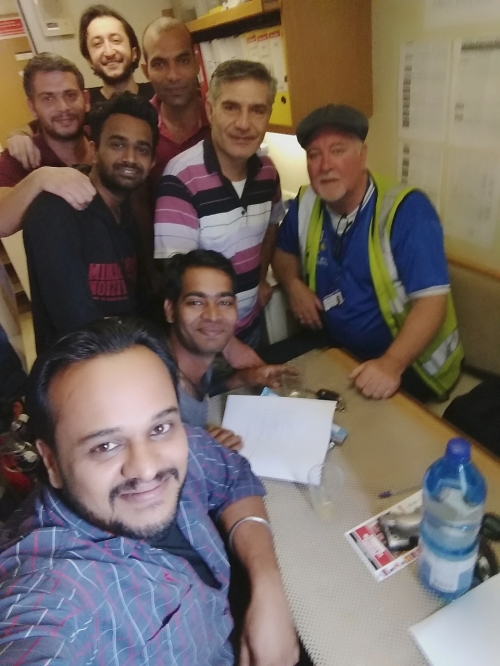





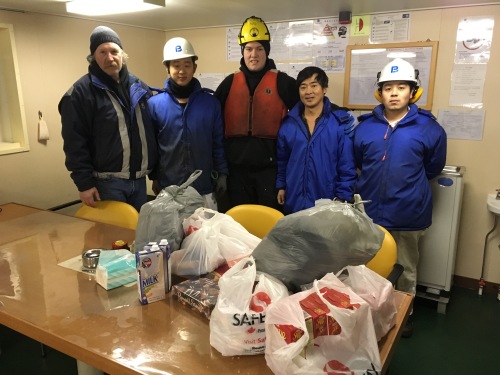










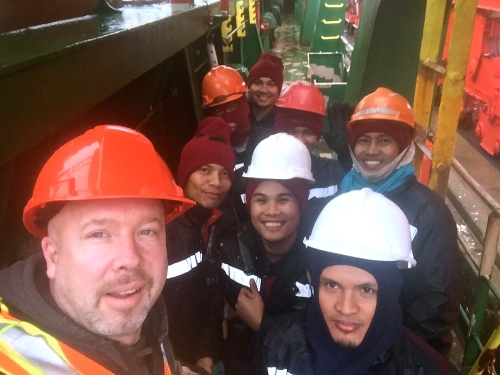

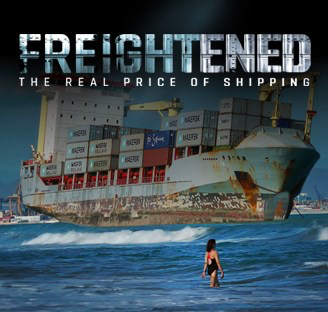


 For immediate release — because we’re out the door to a loud, rowdy, hands-off-our-jobs rally! More to follow.
For immediate release — because we’re out the door to a loud, rowdy, hands-off-our-jobs rally! More to follow.
